According to their latest report called Fragile Frontier: Democracy’s Growing Vulnerability in Central and Southeastern Europe, Ukraine’s post-Orange Revolution progress in aspects that include national democratic governance, an independent media, the electoral process, independence of the judiciary and fighting corruption, continues to plummet. Moreover, the negative trends listed in Freedom House’s Freedom in the World 2011 report from last year continue, with the last remaining free country in the region gradually sliding down to the group of partly free countries. Two years of Viktor Yanukovych’s presidency clearly show the process of unfolding initiatives for the revival of a state system based on the authoritarian schemes implemented by Russia under Vladimir Putin.
70 YEARS OF STRUGGLE FOR FREEDOM
Freedom House is not a new or unknown phenomenon to Ukraine, but for the most part, for Ukrainians, this knowledge is limited to the awareness of the existence of such an institution. In fact, it is one of the most powerful and proactive institutions for the promotion of democracy in the world. Its experts deliver regular reports to the US Congress, hold briefings for the Presidential Administration and State Department, and work closely with the world’s leading media, as well as scientific and education institutions.
The history of Freedom House goes back to 1941. It was established in New York, supported by President Roosevelt who was trying to boost public support for America’s participation in WWII, as isolationist sentiments peaked in US politics. Its founders were influential American journalists, academics, business and trade union leaders, as well as one-time civil servants.
Initially, this organization was set up to counteract totalitarian ideologies, such as Nazism and Communism through the promotion of democratic practices throughout the world, endorsing the post-war Atlantic Alliance, as well as such key policies and institutions, such as the Marshall Plan and NATO. In the 1970s, Freedom House implemented a series of programmes to promote democracy in Communist and anarchist regimes in Asia, Africa, Central Asia and Latin America, combining research, human rights campaigns and direct involvement in crisis zones, such as Vietnam or Cambodia. At this time, Freedom House also arranged a hearing for Andrei Sakharov and other soviet dissidents in Washington and was among the first supporters of Poland’s Solidarity movement.
Freedom House has had a representative office in Ukraine for nine years now. In 2004, it published “Countries at the Crossroads”, a report focusing on democratic governance and compliance with the rule of law in a range of countries, including Ukraine. During the 2004 presidential election in Ukraine, it helped coordinate the first regional public monitoring of the election process, by mobilizing thousands of representatives or reform-oriented monitoring groups.
THE WEIGHT OF CRITERIA
Fragile Frontier: Democracy’s Growing Vulnerability in Central and Southeastern Europe,published in 2012, is a continuation of Nations in Transit, a series of Freedom House’s annual reports, which is direcly dedicated to the situation in post-Communist states, the first of which was published in 1995. This year’s report is an extensive analysis of democratic changes in 29 Central and East European, Balkan and FSU states from Russia to the countries of Central Asia. The reports are based on the analysis of 7 major criteria, including the electoral process, civil society, the independence of the media, national and local democratic governance, judicial structure and independence and the level of corruption. Annual ratings are based on a scale of 1 to 7, where 1 is the highest level of democratic progress and 7 is the lowest. Freedom House experts stress that every index takes into account the practical effect of the protection of rights and freedoms by government or non-government forces, not only government initiatives or legislative analysis.
Each of the 7 criteria has a specific meaning. The national democratic governance index shows the extent to which the state system is democratic and sustainable; the independence, efficiency and responsibility of the legislative and executive branches; and the democratic oversight of the military and security services. The determination of the quality of the election process is based on analyses of national elections, the development of the multi-party system and public participation in elections. The determination of the development of NGOs, their organizational capacity and financial stability, and the legislative and political environment in which they exist; as well as the development of trade unions and groups of society involved in political processes constitutes the civil society index. The independence of the media is based on the assessment of freedom of speech, including laws on libel, the persecution of journalists, level of editorial independence, public access to the Internet and the amount of financially viable privately-owned press. Local democratic governance is considered to be the extent of the decentralization of power, responsibility, electivity and capabilities of local governance, as well as the transparency and accountability of local authorities. Judicial structure and independence is determined via the analysis of the national reform of the Constitution and the Criminal Code, the protection of human rights, level of judiciary independence, the treatment of defendants and compliance with court verdicts. Corruption is measured through the research of public perception of corruption, the business interests of top officials, laws on financial confidentiality and conflict of interests, as well as the efficiency of anti-corruption initiatives.
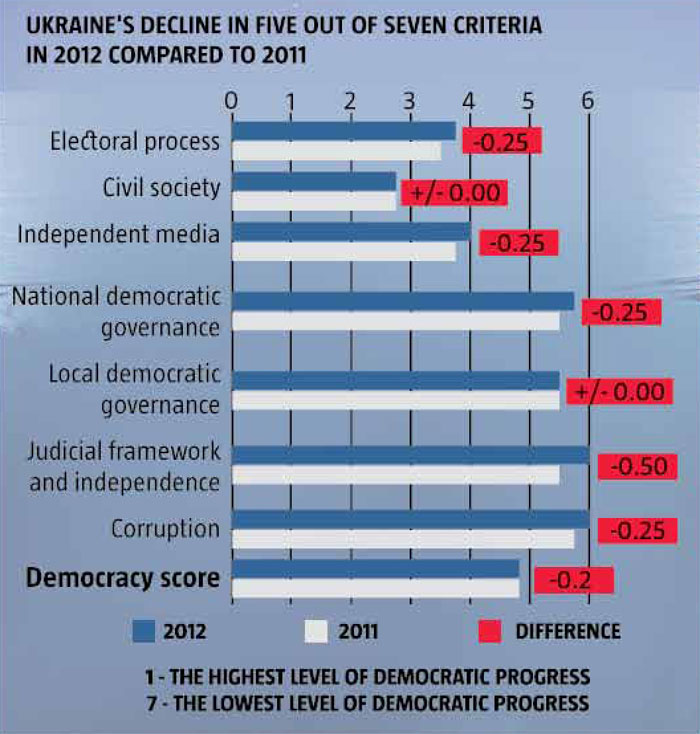
WHERE IS UKRAINE HEADING?
Last year, Freedom House’s special report on Ukraine Sounding the Alarm: Protecting Democracy in Ukraine claimed that “Ukraine under President Yanukovych has become less democratic and, if current trends are left unchecked, may head down a path toward autocracy and kleptocracy”. Now most of the key concerns remain the same, and in its latest report, Freedom House experts focus on three obvious trends in the behavior of the current government: an increase in the lack of transparency in reporting and growing corruption in government institutions; turning the judiciary into a pro-government tool, selective prosecution of oppositional figures and the granting of more extensive privileges and powers to executive authorities; and attempts to suffocate a wide range of socially critical institutions, from higher education establishments to the news media.
The major new developments since the last Freedom House report concern the so-called familization and corruption in Ukraine. The term was first used by the assessment mission in April 2012 to underscore the degree to which those in power, particularly President Yanukovych and his inner circle, have made a fortune and whose family members have become wealthy and influential at an astonishing rate. Some observers have referred to this trend as the creation of “The Family” in which the sons, other relatives and friends of the president increasingly concentrate political and economic power in their own hands.
Notably, the Presidential Administration is doing its best to take the judiciary under even greater control and restrict its already limited autonomy. Courts have already become tools of repression against the political opposition and civil activists. Just like Hungary, Ukraine is now experiencing the direct political manipulation of court processes and the growing interference of special services in social processes. In December 2011, for instance, Verkhovna Rada expanded the powers of the SBU, Ukraine’s security service, in investigating cases that qualify as “mass unrest” under the Criminal Code. As a result, Ruslan Zabily, the Director of the National Memorial Museum of Victims of Occupation Regimes “Tyurma na Lonskoho” (the Prison on Lonskoho St.) in Lviv, was accused of “disclosing state secrets”, labeled as the “Case against Ukrainian Historians”; criminal cases were initiated against the leaders of the Tax Maidan; the cases against Yulia Tymoshenko and Yuriy Lutsenko and nearly ten more people from Tymoshenko’s Cabinet, half of which have spent 8 to 12 months in detention centers, have caused a major uproar.
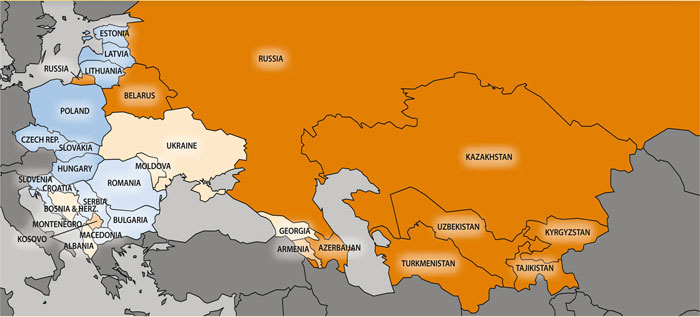
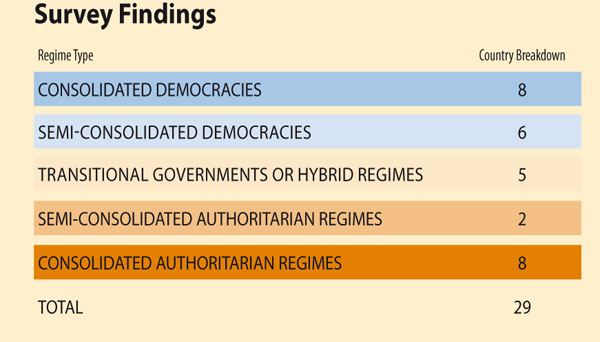
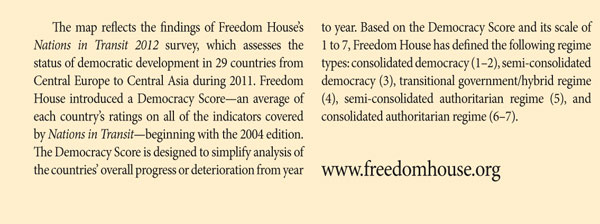
The Ukrainian government is actively fighting to gain control over the Ukrainian media and exert pressure on freedom of speech. One visible fact is that the journalists and editors at most Ukrainian publications are now express themselves more carefully when addressing politically sensitive issues. Another innovation in Ukrainian broadcasting, obviously implemented by the current pro-government regime to strengthen its positions in the media, is the nationwide replacement of analog television with digital broadcasting. The process is due to be completed by 17 June 2015. Essentially, this is the government’s attempt to monopolize television, as is the case in authoritarian countries, including Russia. Freedom House experts note that this transition allows Mr. Yanukovych’s regime to gain comprehensive control over the flow of information transmitted by TV channels. TV continues to be the source of latest news for most Ukrainians.
It should also be noted that the vast majority of those who own broadcast and print media outlets in Ukraine are closely tied to or are members of the current government and are busily consolidating and expanding their control over new outlets. This warm relationship between media owners and political power has led to media outlets pursuing the agendas of their owners at the expense of objectively and responsibly covering current events, as well as meeting the demands of the public. As the result, censorship in Ukraine generally results from economic pressure on media owners, rather than from direct government interference. However, Freedom House observers accuse the government of instigating economic pressure and applying it to owners – who in turn apply pressure on individual journalists – to curb critical media coverage.
Whereas most areas have worsened, as noted in both last and this year’s reports, civil society appeared more animated and less dispirited in the reporting year than in the previous year. Every country on Earth has just four real powers, such as state government, the opposition, NGO’s and the international community. Currently, only last two are trying to improve the situation in Ukraine.
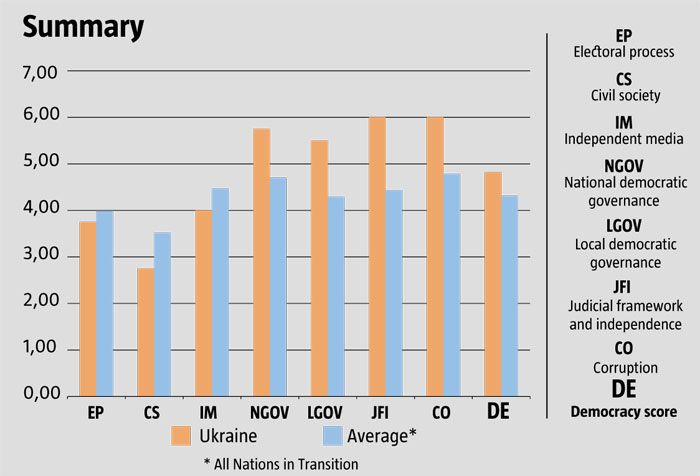
The level of democracy in Ukraine has now hit the 2004 level when Leonid Kuchma was president. The situation is unlikely to change without the proactive impact of society. The government that has just passed a law, essentially making Ukraine officially bilingual, is unlikely to take any real steps towards democratization and will falsify the upcoming election. The time has come for Ukrainians to make a stand and protect their achievements, because a nation with the status of a transitionary regime could easily slip into the category of a country with a consolidated authoritarian regime.

